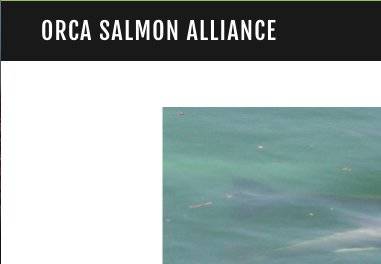Submitted by the Orcas Salmon Alliance
Leaders of the Orca Salmon Alliance delivered more than 43,000 citizen comments to Gov. Jay Inslee and the co-chairs of the Emergency Southern Resident Task Force, created by the governor through executive order earlier this year. Delivery of the public comments emphasized urgency and called for leadership at a press conference outside the task force’s third meeting at the Confluence Technology Center in Wenatchee on Tuesday, Aug. 7.
The “Sound the Alarm for Orcas” citizen petition was created and circulated by the Orca Salmon Alliance. It has been signed by more than 43,200 members of the public who are committed to the survival and recovery of Southern resident orcas and the Chinook salmon they depend upon. The petition calls on governor Inslee and the task force to develop a series of recommendations that will halt the decline of the Southern resident orcas and recover the salmon, watersheds and ecosystems they depend on for survival.
The petition specifies categories of action that the task force must address, including:
• Prioritize Chinook salmon habitat restoration and fish-barrier removal projects that will most benefit orcas.
• Increase Chinook salmon productivity and survival in the Columbia River Basin by maximizing beneficial spill at the lower Snake and Columbia River dams.
• Increase funding for pollution prevention and clean-up programs.
• Identify and meet an ecologically relevant noise reduction goal.
• Address risk reduction for oil spills and improved safety measures for oil transportation.
• Create a permanent Orca Recovery Coordinator position to manage, direct and coordinate recovery efforts.
Further, the petition calls on the task force to prioritize an overall goal of growing and managing healthy, resilient, connected and functional ecosystems. Continued and expanded reliance on technologies and human interventions – rather than on functional ecosystems – will be unlikely to meet the needs of salmon, orcas and people.
Sam Mace, Inland Northwest Program director for the Save Our wild Salmon Coalition: “Rebuilding healthy Columbia and Snake river salmon populations must be a cornerstone of any effective plan to protect Southern Resident orcas from extinction. Salmon – and therefore orcas – require cooler, more resilient and connected rivers. We need Gov. Inslee and other elected officials bringing people together around shared solutions.”
Rein Attemann, Puget Sound Campaign manager for the Washington Environmental Council: “The extinction of Southern resident orcas is on the table today. Without political leadership and commitment to act immediately from Northwest sovereigns and stakeholders, we will risk losing these irreplaceable whales forever.”
Deborah Giles, rcience advisor to the Orca Salmon Alliance: “This is a five-alarm emergency. These whales need more salmon now. Immediate measures are crucial to ensure their access to the salmon currently available, and to restore vital stocks throughout the orcas’ range. Without immediate and effective measures, these whales will not survive.”
Robb Krehbiel, Northwest representative, Defenders of Wildlife: “Southern resident orcas face a multitude of threats, including a lack of salmon and toxic contamination destroying our watersheds. Orcas and salmon depend on clean water, healthy shorelines and estuaries, free-flowing rivers, and protected watersheds for survival. They need change immediately, not years from now.”
The Southern resident orcas’ urgent fight for survival was on tragic, graphic display over the past two weeks as J35 (Tahlequah), carried her lifeless newborn daughter on her head in what many have described as a procession of grief. Tahlequah’s calf died just 30 minutes after birth. Accompanied by members of her pod, Tahlequah’s mourning for her daughter continued for at least 10 days through the waters of Salish Sea near the San Juan Islands. The heartbreaking procession, shared around the world through video and in photographs, has inspired an international call to save these iconic orcas.
On March 2018, in response to a series of deaths in the critically endangered Southern resident orca population that brought them to their lowest population level in 30 years, Gov. Jay Inslee created the Southern Resident Recovery Task Force. The task force is led by co-chairs Les Purse and Stephanie Solien, and includes more than 40 regional representatives of government agencies, stakeholders, scientists, Tribes, and non-governmenta organizations.
Just 75 Southern resident orcas remain today – the lowest number in 34 years. The population was listed as endangered under the Endangered Species Act in 2005; its population since then has further declined.
Visit www.orcasalmonalliance.org for more info.




